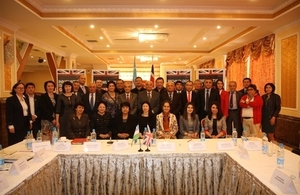Uzbek and British scholars exchange knowledge at the Round Table
On 6 March 2014 a UK-Uzbek Round Table on "Climate change and global food security" was held in Tashkent.

Uzbek and British scholars exchange knowledge at the Round Table
The event was organised by the British Embassy in Tashkent in cooperation with the Academy of Sciences of Uzbekistan and the Science and Innovation Section of the British Embassy in Moscow. British and Uzbek scholars discussed the link between climate change and spread of parasite infections among wild and domestic animals.
More than 30 scientists from institutes of the Academy of Sciences of Uzbekistan including the Institute of Gene Pool of Flora and Fauna, the Institute of Genetics and Plant Experimental Biology, the Institute of Bioorganic Chemistry, the Institute of Immunology, the Institute of Microbiology and the Centre for Genomics and Bioinformatics, as well as experts from the Ministry of Health, the Ministry of Higher and Secondary Education and the State Committee for Environment Protection of Uzbekistan attended the event.
Mr George Edgar, British Ambassador to Uzbekistan, Dr Shavkat Salikhov, President of Academy of Sciences, Mr Bakhtiyor Abdusamatov, Head of the State Committee for Environment Protection, and Dr Julia Knights, Head of the Science and Innovation Section of the British Embassy in Moscow, welcomed the participants in the Round Table and spoke about the purpose and importance of the event.
Ambassador Edgar said at the opening ceremony:
This is an exciting event that I hope will be only the start of closer scientific co-operation between the UK and Uzbekistan. I particularly welcome the Round Table’s focus on the impact of climate change, which is the biggest challenge facing the world’s peoples and governments today, and an issue on which international co-operation is essential.
Leading experts in parasitology from British and Uzbek side, including Dr Eric Morgan of the School of Veterinary Sciences, University of Bristol, UK, and Member of the Academy of Sciences Djalolliddin Azimov of the Institute of the Gene Pool of Flora and Fauna, Uzbekistan, presented their reports. The speakers noted that in all regions of the world parasite infections are the most important production-limiting diseases in livestock, and that climate change is tending to improve conditions for their transmission, while also increasing the unpredictability of disease. The participants in the Round Table also considered what tools are needed to equip livestock farmers to deal with changing parasite threats, and whether optimised management can successfully attenuate predicted increases in disease.
On 7 March 2014, after the end of the Round Table, Dr Morgan will visit the National University of Uzbekistan, where he will meet academic staff and deliver a lecture on veterinary parasitology for students of the Biology Department. He will also visit the Centre for High Technologies, whose role is to provide the highest standards of applied scientific research and innovation practice.
Updates to this page
-
Added translation
-
Added translation
-
First published.